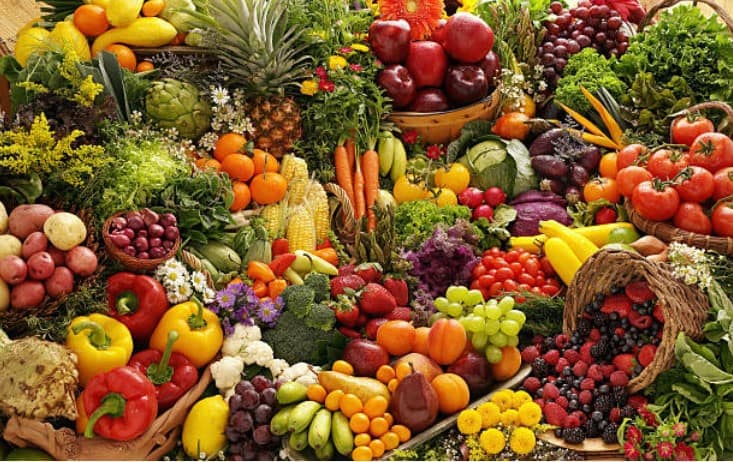If you make the appropriate food choices, they can keep you healthy and energized all day. The secret is to consume meals composed of low glycemic index carbs mixed with protein and modest amounts of healthy fats to maintain stable blood sugar levels. Another expert recommendation is to eat roughly every four hours to maintain a consistent energy flow. A balanced meal can keep you nourished for up to four hours. Avoid high-sugar foods if you want to sustain energy since they cause your blood sugar to rise quickly, releasing too much insulin.
1. Fresh Foods and Proteins
Your meal will have more nutrients the fresher it is. Fresh foods often contain higher levels of nutrients than processed foods, which may have had some nutrients removed to extend their shelf lives. Consuming seasonal fruits and vegetables ensures that they ripen naturally. It turns out that bananas contain the ideal amount of carbohydrates, potassium, fiber, and vitamins to give you a significant burst of natural energy. Additionally, bananas frequently cost less than $1 per fruit, which is an unbeatable price for so much added energy. Lean proteins also provide a lot of energy to the human body. Saturated fat is added to your diet by red meats with marbling. While still offering high-quality protein, leaner meats such as chicken, turkey, and fish have lower levels of saturated fat. Salmon and tuna are examples of fish high in omega-3 fatty acids that can increase heart-healthy lipids.
2. Cereals, Grains, Nuts and Seeds
Nuts and seeds are some of the finest meals to combat hunger and weariness. Adding these to your diet can give you energy and beneficial nutrients. Try sunflower seeds, pumpkin seeds, cashews, hazelnuts, pecans, and Brazil nuts. It is advisable to eat raw, unsalted variants. They also make the ideal mid-afternoon snack. Oats are also not just for breakfast. A large bowl of oats has substantial amounts of satiating fiber and even some protein. Additionally, those who experience blood sugar spikes and decreases after eating other processed morning cereals can benefit from it. The best options are the plain varieties of steel-cut oats, old-fashioned oats, and instant packets of oatmeal because they don’t contain added sugar. You can then choose what goes in it, such as milk, a little honey, and a variety of fruit. After that, you can leave with greater vigor to get through the rest of the day.
Refined carbs such as sugar and white flour add little nutrients, just like processed foods. It ensures that your body receives the full benefits of the hull of the grain, which provides fiber to your diet, by selecting whole grain foods and complex carbs. Alternatively, brown rice is an excellent source of magnesium in addition to a balanced serving of complex carbs. One cup offers 20% of the daily magnesium recommendations for men and 25% of the daily magnesium requirements for women. Low magnesium levels hamper the body’s metabolism.
3. Non-Caffeinated Beverages
In moderation, caffeine is safe and has even been linked to some health advantages. Although it gives you a temporary lift, it doesn’t genuinely give your body energy. The first few drinks could energize you. However, you’ll eventually feel exhausted if you’re not giving your body well-balanced meals and snacks. Choose unsweetened tea or black coffee if you must satisfy your fix. When consumed in excess, sodas and energy drinks can cause you to crash and cause other health problems due to their high levels of refined sugar and artificial additives.
4. Water
Water consumption is crucial for the body to function at its best. Although water doesn’t contain calories, it aids the body’s energetic activities to give you more energy. Try to replace sodas, coffee, energy drinks, and other liquids with glasses of water throughout the day. This modification can have a tremendous impact on making you feel better.
Tips for Increasing and Maintaining Energy Levels Throughout the Day
- Maintain balanced blood sugar levels. The recommended amount of time between meals is four hours because a balanced meal can provide energy for up to four hours. This entails spreading out your three meals and two to three snacks throughout the day.
- Avoid high sugar foods. A surge in blood sugar from eating high-sugar foods can make your body release an excessive amount of insulin. The extra insulin subsequently causes a “sugar crash,” which is a drop in blood sugar levels.
- Eat the right food combinations. Low GI carbohydrates paired with protein are the ideal combo for long-lasting energy that will last the full four hours. They deliver their energy into the bloodstream gradually and over time. These foods consist of whole grains like oats, brown rice, whole-wheat bread, and sweet potatoes. Beans and lentils are excellent because they combine protein and low-GI carbs into one compact container. The following are additional excellent sources of protein: fish, poultry, lean meat, tofu, yogurt, almonds, and seeds.
- Include some healthy fat sources in your diet. Olive oil, almonds, and oily seafood are good sources of fat that will make you feel full and prevent you from overeating.
- Avoid excess caffeine as much as possible. Long-term energy levels are decreased by excessive coffee consumption.
The Bottom Line
Knowing what’s on your plate can be a beneficial and healthy method to maintain your energy. You can maintain healthy energy levels throughout depressed episodes by engaging in regular exercises and consuming a nutritious diet. Consider taking a vitamin daily if your diet isn’t providing you with what you need. You could begin a nutritional supplement routine by speaking with a dietitian or a homeopath. Energy supplements such as Dextro energy vitamin, Slimfast energy, and Phormula 1 are great products to check out. These enhance the suggestions in this article to help you achieve quicker results. Any dietary supplements you are thinking about should be discussed with your doctor.















